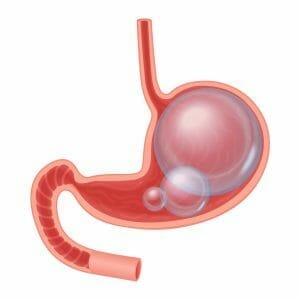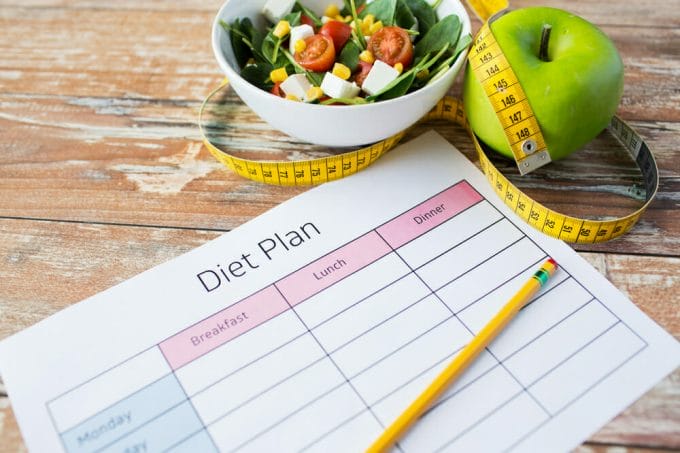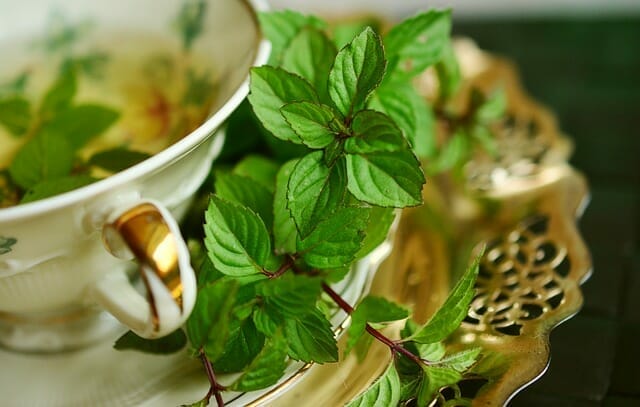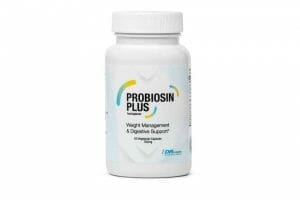Flatulence is a very common gastric ailment suffered by the young, middle-aged and seniors alike. Mostly it is the result of improper eating habits. It manifests itself as an excess of intestinal gas, which distends the abdominal cavity, leading to the phenomenon of the so-called balloon-like abdomen. Flatulence is a very troublesome and tiresome affliction, especially if it occurs frequently and in high intensity. However, there are many simple ways to get rid of bloating, including a whole arsenal of proven herbs and natural preparations.
Table of contents
- 1 What is bloating?
- 2 Causes of bloating and intestinal gas
- 3 What are the symptoms of bloating?
- 4 How to get rid of bloating through diet, that is, what to eat to reduce intestinal gas?
- 5 Herbs for bloating – improve digestive processes and reduce a bloated abdomen
- 6 Chamomile for flatulence
- 7 Fennel for flatulence
- 8 Boldo for flatulence
- 9 Mint for flatulence
- 10 Cumin for flatulence
- 11 Anise for flatulence
- 12 Medications for abdominal bloating and intestinal gas.
- 13 Multicomponent dietary supplements – comprehensive help for constipation, indigestion, abdominal bloating and intestinal gas.
- 14 Probiotics for flatulence
- 15 Home remedies for flatulence – proven traditional recipes
- 16 What else helps with bloating – priceless physical activity.
What is bloating?
The food we consume is broken down into smaller particles. Necessary nutrients are absorbed into the tissues, and unnecessary nutrients are metabolized with the participation of bacteria (intestinal fermentation) and then excreted. A byproduct of the digestive processes is the gas formed in the intestinal tract. Intestinal gas includes hydrogen, methane, carbon dioxide and hydrogen sulfide, among others.
Under normal conditions, the volume of gas in the intestines is about 200 ml. This amount is completely natural. It does not indicate a digestive disorder and does not cause any discomfort. What is different is when too much gas forms in the intestines. Abdominal bloating is precisely the consequence of excessive intestinal gas. In most cases, bloating is the result of improper eating habits, including reaching for unhealthy or heavy-digestible foods, eating beyond one’s means, practicing an improper way of eating (such as eating too fast).

Along with constipation, bloating is one of the most troublesome digestive complaints. This problem affects people of all ages, with those particularly prone to bloating being:
- people who eat a lot of gas-forming foods,
- people over 65 years of age,
- people who are overweight and obese,
- people who are not very physically active,
- people suffering from intestinal diseases and food allergies,
- pregnant women.
Causes of bloating and intestinal gas
Anyone who struggles with bloating and gas is well aware that they interfere immensely with daily life and effectively make you feel uncomfortable. How to combat this unpleasant ailment? We should certainly start by observing our own body and finding out the cause of the problem, and then eliminating it, whether by modifying dietary habits, changing our lifestyle, or using appropriate herbs and home treatments.
The most common causes of increased gas accumulation in the digestive tract and the formation of abdominal bloating are:
- excess of simple sugars in the diet,
- consumption of fatty and heavy dishes,
- a diet based on highly processed foods,
- consumption of bloating dishes,
- too much fiber in the diet (without simultaneously drinking plenty of fluids),
- sedentary lifestyle,
- drinking carbonated beverages,
- increased aspiration and swallowing of air (especially as a result of eating too fast and eating too large of a bite),
- overeating and retention of food content in the stomach and intestines,
- excessive intestinal fermentation,
- inflammatory bowel diseases,
- intestinal obstruction,
- diseases of the liver, pancreas, biliary tract,
- irritable bowel syndrome,
- impaired intestinal peristalsis,
- insufficient secretion of lactase (the enzyme that enables lactose digestion) and other digestive enzymes.
What are the symptoms of bloating?

The immediate cause of bloating is the accumulation of gas in the gastrointestinal tract, mainly the large intestine.
Symptoms of bloating are:
- enlargement of the abdominal girth,
- swelling of the abdomen (the so-called abdomen like a balloon),
- abdominal pain,
- a feeling of increased tension in the abdomen and expanding from the inside,
- increased passing of “wind”,
- a feeling of overcrowding in the abdominal cavity,
- belching,
- intestinal colic, intestinal cramps,
- overflowing in the abdomen,
- nausea.
How to get rid of bloating through diet, that is, what to eat to reduce intestinal gas?

Flatulence is very often the result of an unhealthy diet, eating meals that are too rich and heavy, and excess carbohydrates. Especially if bloating and gas accompany us after eating, we should take a closer look at our menu.
7 tips to implement when struggling with bloating:
- Watch out for vegetables with bloating properties, including onions, chives, garlic, leeks, legumes (e.g. peas, beans, broad beans, chickpeas), brassica vegetables (e.g. cabbage, Brussels sprouts, cauliflower, broccoli). Admittedly, they are very healthy, but eaten in large quantities they very often contribute to bloating and gas. You don’t have to avoid them completely, but try to eat them in small portions at a time and not eat them too often. It is a good idea to drink herbal tea after a meal with bloating vegetables.
- If eating dairy products makes you bloated, you may be suffering from lactose intolerance. In this case, limit milk (instead of traditional milk you can reach for lactose-free milk), dairy drinks, soft cheeses, cream, and reach more often for fermented dairy products (yogurts, kefirs) and hard cheeses, which contain much less lactose.
- Limit your consumption of honey and fruits high in fructose. Fructose is a type of sugar that is absorbed quite poorly and can linger in the intestines, leading to the production of excessive intestinal gas. Sorbitol, mannitol and xylitol can also have this effect.
- Avoid carbonated beverages. They contain a lot of carbon dioxide, which intensifies the formation of intestinal gas. Also watch out for alcoholic beverages, which can also lead to bloating. Instead of reaching for unhealthy drinks, drink plenty of still water. Water with lemon will also work well (you can also add a few fresh mint leaves to it).
- Avoid eating large, satiating, hearty portions at a time. It is better to eat more often, but in smaller portions. Then digestion processes run smoothly, and foods are absorbed and metabolized on the fly, instead of lingering in the intestines and emitting increased amounts of gas.
- Avoid sweets, ready meals, fatty and floury foods. Focus on easily digestible, natural, dietary meals.
- Don’t eat in a hurry, take small bites of food. Don’t swallow food immediately after the initial chewing, but carefully and slowly grind it in your mouth, and only swallow.
Herbs for bloating – improve digestive processes and reduce a bloated abdomen

Drinking herbs is a well-known remedy for bloating that has been around for a long time. Herbal ingredients have the advantage of improving the work of the entire digestive system, reducing not only bloating, but also other ailments. What’s more, instead of acting temporarily and ad hoc, they have restorative properties. By supporting digestive processes, regulating metabolism, stimulating the function of organs that make up the digestive system and stimulating the secretion of digestive juices, they combat both the effects and causes of gastric problems.
How to use herbs for flatulence? It is best to drink them on a regular basis. They then bring much better results than a single consumption of herbal infusion. Optimal results will be obtained by drinking infusions daily (1 or 2 times a day depending on the herb) for a minimum of one month. If you don’t want to drink herbs every day, at least make yourself a strong infusion every time after eating a hard-to-digest dish or a meal containing products with distended properties.
Some of the most well-known and effective herbs for flatulence are: peppermint, fennel, cumin, chamomile, smooth licorice, aniseed, lemon balm, boldo, angelica litvora, ginger, artichoke, valerian.
How do the various herbs for flatulence work?
Chamomile for flatulence
It has excellent diastolic properties. By relaxing the muscles in the digestive tract, it provides relief from abdominal pain. It also stimulates the secretion of digestive juices. It stimulates intestinal passage, leading to more efficient expulsion of fecal masses and elimination of excess gas.
Fennel for flatulence
By reducing smooth muscle tension in the digestive tract, it counteracts annoying spasms. It improves intestinal peristalsis and prevents the production of excess intestinal gas. It has a windmilling effect, combats colic, feelings of fullness and bloating.
Boldo for flatulence
Supports the work of the bile ducts, liver and intestines. By increasing the secretion of digestive juices, it counteracts indigestion, too slow digestion, constipation and flatulence. Reduces stomach pains.
Mint for flatulence
Effectively eliminates spasms in the digestive tract, allows you to get rid of intestinal gas more easily, eliminates the feeling of distension and fullness in the abdomen. It exhibits choleretic effects, improves intestinal motility and fights flatulence.
Cumin for flatulence
Has antispasmodic effects, improves intestinal function, improves digestive processes. It inhibits the production of gas in the intestines, reducing the risk of bloating. It is also helpful for constipation, heartburn, nausea, abdominal pain.
Anise for flatulence
Stimulates food digestion, counteracts stomach and intestinal cramps, facilitates the removal of gas from the body, prevents excessive fermentation in the intestines, reduces flatulence. It also stimulates the process of cleansing the body of toxins.
Medications for abdominal bloating and intestinal gas.
Most of the drugs available in pharmacies for bloating and gas contain simethicone – a surfactant whose action is to level the surface tension of gas bubbles present in the intestines. The effect is to break up the gas bubbles and expel them more easily from the body.
Medications of this type, while helpful to a certain extent, tend to have an ad hoc and short-term effect, and do not provide comprehensive relief like herbs or some multi-ingredient herbal and probiotic preparations. They only combat the effects of gas accumulation, but do not affect the restoration of intestinal microflora, metabolism or gastrointestinal function, and do not normalize digestive processes.
Multicomponent dietary supplements – comprehensive help for constipation, indigestion, abdominal bloating and intestinal gas.
Multicomponent dietary supplements are mostly multidirectional help for various types of digestive ailments. They help to get rid of not only bloating and gas, but also often go hand in hand with them: constipation, abdominal discomfort, belching, a feeling of fullness in the abdomen, heaviness, metabolic disorders, indigestion, overweight, malaise.
By stimulating the secretion of digestive juices, herbal supplements make the digestion of fats, carbohydrates or proteins more efficient. Many supplements, thanks to their fiber content, activate peristaltic movements of the intestines, resulting in efficient cleansing of the intestines of deposits, toxins, gases and metabolic by-products.
Probiotics for flatulence

Probiotics are extremely beneficial strains of lactic acid bacteria that take care of the proper composition of our intestinal microflora, and thus strengthen the gastrointestinal tract, guard efficient digestive processes, improve immunity and protect against infections.
Consumption of probiotic products is recommended for people complaining of various digestive problems, including weakened intestinal peristalsis, bloating and constipation. Probiotics can be taken in the form of ready-made preparations containing selected strains of lactic acid bacteria or fermented milk products (buttermilk, yogurt, kefir).
Check out a rich set of probiotics enriched with plant extracts that improve digestion: Probiosin Plus

Home remedies for flatulence – proven traditional recipes
With the help of a few instant and simple recipes, improve digestion and minimize the production of intestinal gas that leads to bloating:
- Pour 1 teaspoon of crushed cumin seeds over a glass of boiling water. We brew under a cover for 15 minutes. Strain. We drink the infusion prepared in this way in smaller portions (2-3 times a day) around meals.
- Before meals, we consume 1 flat teaspoon of ground cumin mixed with marjoram and drink a glass of water.
- We prepare a herbal mixture from such ingredients as fennel fruit, mint leaf, artichoke herb, plantain leaf, lemon balm leaf, chamomile basket. Pour boiling water over a spoonful of the mixture and let it infuse (covered) for about 20 minutes. Drink 2-3 times a day.
- Add spices with properties that improve digestion and counteract excessive intestinal gas to dishes (especially those that are heavy and puffy): basil, thyme, oregano, marjoram, rosemary, cumin, dill.
- Pour a teaspoon of ground flaxseed into an incomplete cup of warm boiled water. Wait a while to swell, stir and drink (preferably about half an hour before a meal). Remember not to exceed the dose of 2-3 tablespoons of flaxseed per day. During the course of the treatment with the linseed, you need to remember to increase the amount of water you drink during the day.
- In a blender mix together: 1 grapefruit, 1 apple, 1 banana, 1 tablespoon of flaxseed, 1.5 cups of water. Thus prepared cocktail for intestinal cleansing is best drunk in the morning several times a week.
What else helps with bloating – priceless physical activity.
The intestines definitely do not like stagnation. Most people who walk little, don’t do any sports and spend most of their time sedentary struggle with bloating and constipation.
That’s why it’s a good idea to introduce regular, frequent walks or another form of activity into your schedule, such as jogging, aerobics, swimming, team games, mat exercises, etc. Our “lazy” intestines will then be stimulated to activity, which in turn will affect faster movement of food debris into the colon, easier passing of gas and no bloated abdomen effect.
Sources:
- https://www.healthline.com/health/gas-flatulence
- https://www.healthline.com/nutrition/tea-for-bloating
- https://www.webmd.com/digestive-disorders/features/bloated-bloating

